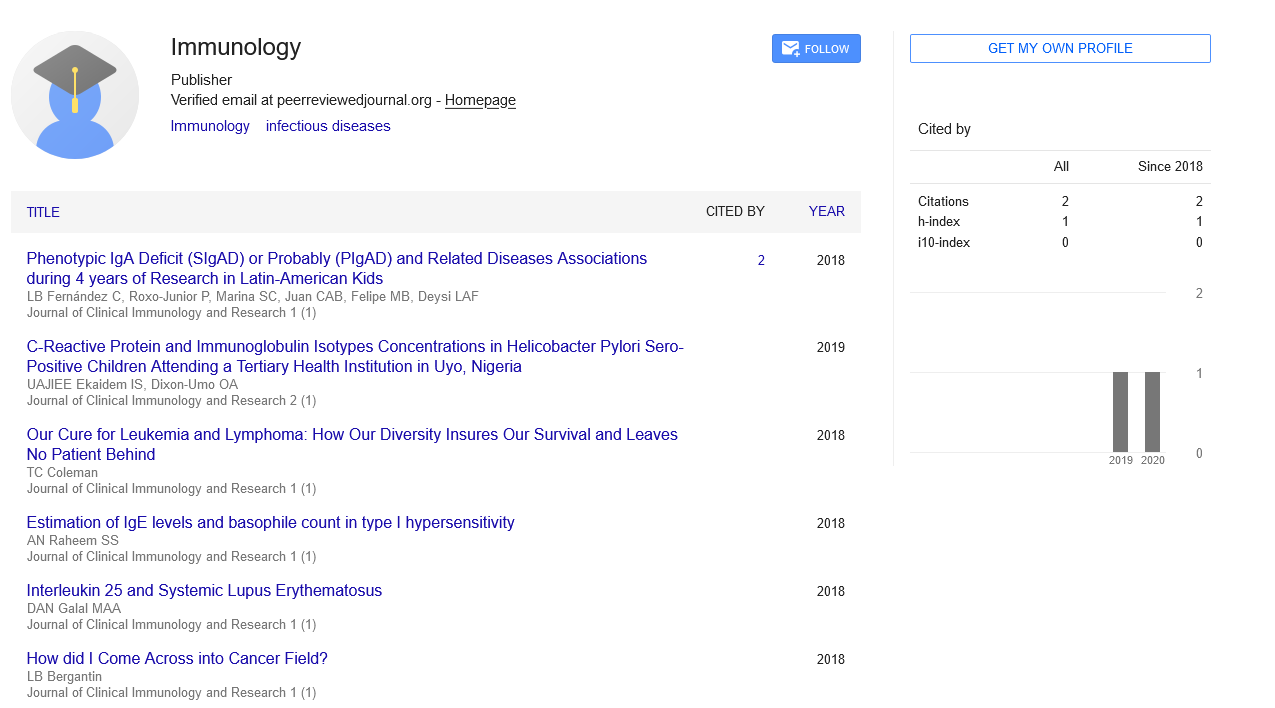Perspective, J Clin Immunol Res Vol: 6 Issue: 1
Immune Monitoring and Protection by Cytotoxic T Cells
Wano Cheng*
1Department of Hematology, Ren Ji Hospital, Shanghai Jiao Tong University School of Medicine, Shanghai, China
*Corresponding Author: Wano Cheng
Department of Hematology, Ren Ji
Hospital, Shanghai Jiao Tong University School of Medicine, Shanghai, China
E-mail: chewan@renji.com
Received date: 19 March, 2023, Manuscript No. JCIR-23-99613;
Editor assigned date: 22 March, 2023, PreQC No. JCIR-23-99613 (PQ);
Reviewed date: 05 April, 2023, QC No. JCIR-23-99613;
Revised date: 12 April, 2023, Manuscript No. JCIR-23-99613 (R);
Published date: 19 April, 2023, DOI: 10.4172/JCIR.100066
Citation: Cheng W (2023) Immune Monitoring and Protection by Cytotoxic T Cells. J Clin Immunol Res 6:1.
Description
Cytotoxic T cells, also known as CD8+ T cells, play a vital role in the immune system's defense against infections and cancer. These specialized cells are capable of recognizing and eliminating infected or abnormal cells, making them vital for maintaining immune surveillance and protecting the body from harmful invaders.
Characteristics
Cytotoxic T cells are a subset of T lymphocytes that express the CD8 protein on their cell surface. They are generated in the thymus during T-cell development and undergo maturation to become effector cells capable of directly killing target cells. Cytotoxic T cells possess a unique T-Cell Receptor (TCR) that allows them to recognize specific antigens presented on the surface of infected or abnormal cells.
Functions
Antigen recognition and activation: Cytotoxic T cells can recognize antigens presented on Major Histocompatibility Complex Class I (MHC-I) molecules. This recognition occurs when the TCR on cytotoxic T cells binds to the antigen-MHC complex on the target cell. Co-stimulatory signals from other immune cells, such as dendritic cells, are also required for full activation of cytotoxic T cells.
Target cell killing: Once activated, cytotoxic T cells exert their effector function by killing the target cells. They release perforin and granzymes, which induce apoptosis, or programmed cell death, in the target cells. Additionally, cytotoxic T cells can express Fas Ligand (FasL) on their surface, which can bind to Fas receptors on target cells, triggering apoptosis.
Immune memory: After an immune response, a subset of cytotoxic T cells survives as memory cells. These memory cytotoxic T cells provide long-term protection and can mount a rapid and robust response upon re-exposure to the same antigen. This immune memory is important for preventing reinfection and controlling persistent infections.
Importance
Viral infections: Cytotoxic T cells play a vital role in controlling viral infections by directly killing virus-infected cells. They recognize viral antigens presented on infected cells and eliminate them, preventing the spread of the virus and limiting the severity of the infection. Vaccines targeting viral pathogens often aim to induce a strong cytotoxic T-cell response.
Tumor surveillance: Cytotoxic T cells are essential for immune surveillance against cancer. They can recognize and eliminate tumor cells that display tumor-specific antigens. However, tumors can evade cytotoxic T-cell responses through various mechanisms, highlighting the importance of developing strategies to enhance cytotoxic T-cell activity in cancer immunotherapy.
Transplantation: Cytotoxic T cells also play a role in transplantation immunology. In the context of organ transplantation, cytotoxic T cells can recognize and attack the transplanted organ as foreign. This can lead to transplant rejection. Immunosuppressive therapies are often used to dampen cytotoxic T-cell responses and prevent graft rejection.
Conclusion
Cytotoxic T cells are important defenders of the immune system, capable of recognizing and eliminating infected or abnormal cells. Their ability to directly kill target cells and establish immune memory makes them indispensable in fighting viral infections, surveilling against cancer, and maintaining immune balance. Understanding the functions and regulation of cytotoxic T cells is important for developing effective immunotherapies and vaccines to combat infectious diseases and cancer.
 Spanish
Spanish  Chinese
Chinese  Russian
Russian  German
German  French
French  Japanese
Japanese  Portuguese
Portuguese  Hindi
Hindi 